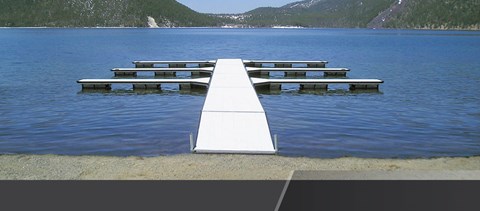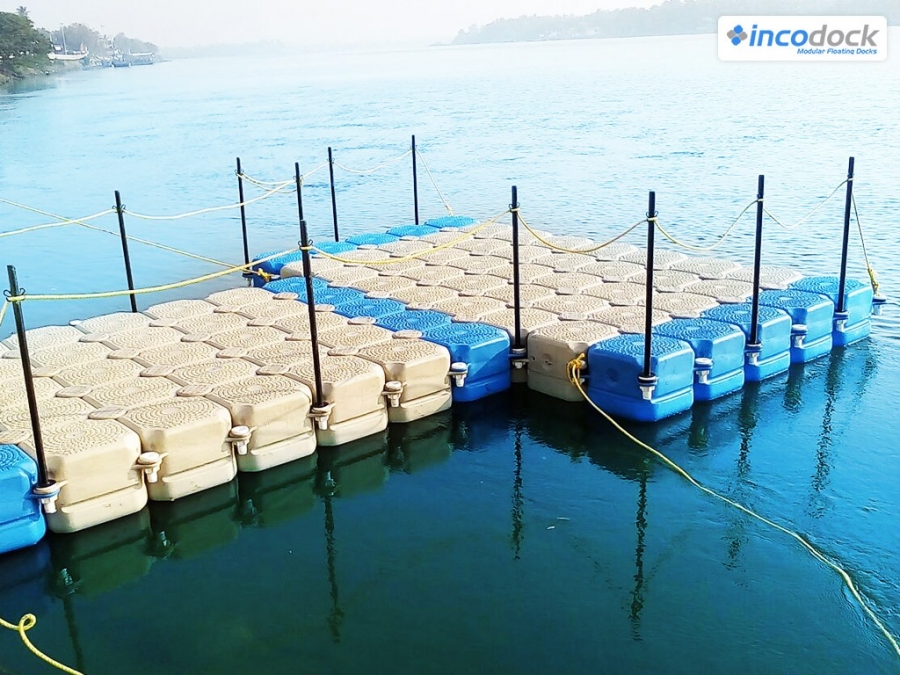Floating Docks: The Ideal Choice for Versatile Water Access
Floating docks existing a compelling remedy for a range of water access needs, supplying versatility that transcends conventional mooring alternatives. Their capability to adjust to fluctuating water levels while guaranteeing stability and safety makes them especially helpful for both commercial and recreational applications. In addition, the modular nature of floating docks facilitates customization, dealing with particular needs. However, the subtleties of setup and maintenance, alongside the variety of applications, warrant a closer evaluation to completely value their potential benefits and implications for river accessibility strategies.
Advantages of Floating Docks
Floating docks deal many advantages that improve water accessibility for different applications. Their ability to fall and increase with transforming water degrees makes them specifically advantageous in environments with rising and fall trends or seasonal variants. This adaptability makes sure that vessels can quickly tie without problem for the water's depth, providing a dependable system for recreational, commercial, and industrial usages.
Additionally, floating docks are commonly built from durable products that resist deterioration, making them ideal for long-lasting usage in aquatic environments. Their setup is generally much less intrusive than conventional set docks, minimizing the ecological impact and promoting quicker implementation (floating dock company). This adaptability permits less complicated relocation or reconfiguration according to customer demands or ecological changes
Safety is another vital benefit; floating docks can supply steady accessibility for people boarding or getting off from boats and decrease the risk of crashes connected with unpredictable surfaces. They can be designed to accommodate a range of accessories, such as fenders and cleats, boosting performance. On the whole, floating docks represent an efficient remedy for enhancing water access throughout diverse sectors while promoting safety and environmental sustainability.

Kinds Of Floating Docks
Various types of floating docks satisfy various requirements and environments, each developed with particular features to optimize performance. The most usual types consist of modular docks, which contain interlacing sections that enable very easy personalization and expansion. These docks are suitable for leisure use, as they can be tailored to fit various watercraft sizes and water problems.
An additional popular choice is the stationary floating dock, which stays secured in area but floats with transforming water degrees. floating docks. This type is specifically suited for areas with minimal tidal fluctuations, providing secure accessibility for fishing or swimming. Additionally, there are drive-on docks, which feature a sloped design that enables boats to quickly drive on and off, making them appropriate for individual watercraft and smaller vessels
For business applications, durable floating docks are offered, built from enhanced products to endure considerable tons and harsh marine atmospheres. Last but not least, environmentally friendly floating docks make use of sustainable materials and styles to decrease ecological effect, frequently incorporating features like vegetation to sustain local wildlife. Understanding the numerous kinds of floating docks makes certain that customers can pick the most proper option for their particular requirements.
Installation Refine Overview
A successful installment of floating docks useful content needs mindful preparation and focus to detail to make certain optimal efficiency and safety and security. The preliminary action involves assessing the site conditions, consisting of water depth, existing, and prospective barriers. This assessment informs the choice of the appropriate dock products and style customized to the certain environment.
Next, obtaining essential authorizations is essential, as numerous territories have laws relating to building on water bodies. The installment can continue when authorizations are secured. Begin by preparing the structure, which might involve anchoring systems or pilings tailored to the dock kind and neighborhood problems.
Following the foundation configuration, set up the dock areas according to supplier requirements. Make sure that all elements are firmly fastened and straightened to hold up against environmental stresses. Placement the dock in the assigned area, guaranteeing it is degree and stable.

Upkeep Tips and Ideal Practices
After the installment process is total, ongoing maintenance plays an essential function in making certain the longevity and capability of floating docks. Regular evaluations must be conducted to identify any indicators of damage, degeneration, or wear - dock company. Look for any loosened installations, splits, or splitting up in the dock areas, as these can jeopardize structural integrity
Cleaning up the dock is vital to remove particles, algae, and various other accumulation that can influence its appearance and safety. Make use of a mild pressure clean periodically to maintain cleanliness without causing damages to the surface. Furthermore, using a safety sealant every few years can aid enhance durability and resist ecological wear.
Take notice find more info of the mooring lines and anchors, ensuring they are protected and free from corrosion. Replace any degraded components quickly to stay clear of dangers. Seasonal modifications might also be necessary; throughout severe climate condition, strengthening the dock or rearranging can stop damage.
Applications for Floating Docks
Floating docks serve a wide range of applications, satisfying both recreational and business requirements. In recreational settings, they give seamless accessibility to rivers for activities such as boating, angling, and swimming. Their flexible nature permits installation in varying water degrees, making sure risk-free and secure accessibility despite tidal variations.
Commercially, floating docks are crucial for marinas and waterfront companies. They facilitate the docking of vessels, enabling efficient discharging and packing of products. Their modular layout enables for very easy development or reconfiguration to suit transforming company needs, making them ideal for watercraft rentals, trip operations, or fishing charters.
In addition, floating docks are used in ecological applications such as aquatic study and environment restoration. They can work as platforms for scientific studies, keeping track of water quality, or conducting wildlife surveys without disturbing sensitive communities.
In commercial contexts, floating docks are used in construction jobs, supplying access to hard-to-reach locations for devices and employees. Their adaptability, durability, and marginal effect on the atmosphere make them an optimum option for a large range of applications, improving both capability and availability in different water-based environments.
Conclusion
In final thought, floating docks represent an ideal option for diverse water access needs, owing to their adaptability, longevity, and modular design. Floating docks serve as a beneficial possession for leisure, industrial, and ecological tasks, guaranteeing reputable accessibility to rivers and promoting lasting techniques in water settings.
Floating docks existing a compelling service for a selection of water accessibility requires, offering convenience that his explanation transcends standard mooring options.Floating docks offer numerous benefits that boost water accessibility for numerous applications. In general, floating docks stand for an effective remedy for enhancing water access throughout diverse industries while promoting safety and security and environmental sustainability.
An additional popular alternative is the stationary floating dock, which stays anchored in place however drifts with altering water levels.In conclusion, floating docks represent an ideal remedy for diverse water access needs, owing to their flexibility, longevity, and modular layout.